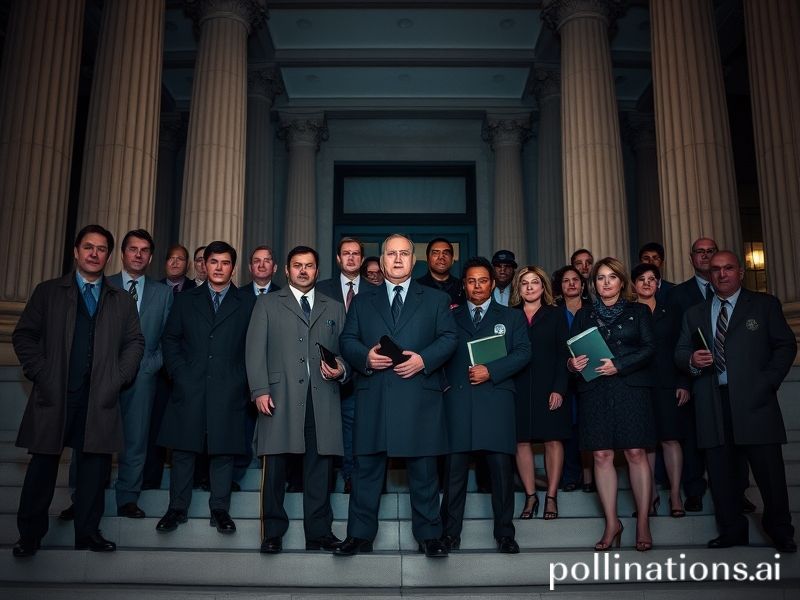Law & Order Cast: America’s Accidental Diplomats in a World That Loves Fake Justice
Law & Order: Global Franchise of Human Folly
By our jaded foreign correspondent who has watched enough police procedurals to qualify for Interpol
The original “Law & Order” cast—those Manhattan prosecutors who never misplaced a file and detectives who could find a moral in a donut—has become a sort of roving diplomatic corps for American anxiety. Reruns beam into 200-odd territories, making Lenny Briscoe’s one-liners the closest thing the planet has to a universally recognized proverb. From Lagos laundromats to Reykjavik rehab centers, someone is sighing at Sam Waterston’s eyebrow-arch of disappointment, a gesture that translates roughly to: “Even here, justice is a part-time gig.”
Internationally, the show functions as both civics lesson and confession booth. In countries where courts move slower than frozen treacle, the 44-minute verdict is pornographically efficient. Serbian viewers use episodes to time their kettles; Brazilian law students screen-grab Jack McCoy’s closing arguments for moot-court bingo. The franchise’s promise—that every corpse gets a backstory and every backstory gets closure—feels aspirational in places where the nightly news is an open-mic of impunity. UN peacekeepers in Mali once built a makeshift cinema out of ammo crates and a bedsheet just to watch “SVU” finales; apparently nothing heals PTSD like watching Ice Cube’s cousin solve sex crimes with the power of righteous scowling.
Cast members have accidentally become soft-power envoys. When the Romanian government wanted to advertise judicial reform, they flew in Fred Thompson—yes, the DA who later ran for U.S. president—to cut a PSA. Locals were less interested in anti-corruption tips than in asking whether the corpse on the slab had health insurance. Meanwhile, Jerry Orbach’s widow still receives condolence bouquets from Japanese fans who address them to “Detective Lenny-san,” proving grief, like counterfeit DVDs, is borderless.
The show’s rotating roster also mirrors the gig economy long before it had a name. One week Angie Harmon, the next Alana de la Garza—an employment whiplash that foreshadowed every zero-hour contract from Uber to Ukrainian drone piloting. Actors exit citing “creative differences,” which in Hollywood-speak usually means “found a better tax haven.” Viewers in cash-strapped Argentina recognize the pattern: yesterday’s star is today’s Instagram life-coach selling protein powder to survive.
Global despots, ever the plagiarists, have noticed the formula. Venezuela’s state TV launched “Ley y Orden: Caracas,” where every villain is conveniently foreign. The first episode featured an evil NGO worker poisoning subsidized corn flour; by the finale he was extradited to a country that doesn’t exist. Ratings soared—nothing entertains like confirmation bias wrapped in a badge. Even North Korea allegedly produced a knockoff, though in their version the detectives arrest the victim for wasting state bullets.
Yet beneath the popcorn authoritarianism lies a bleaker truth: the original cast’s moral clarity was itself a special effect. While “Law & Order” preached that no one is above the law, America was busy inventing new tiers of immunity—bankers, tech bros, presidents who live-tweet obstruction of justice. International audiences spot the hypocrisy faster than you can say “double jeopardy.” In Nairobi bars, patrons drink every time a cop on the show bothers with a warrant; liver failure is more immediate than any civil-rights violation.
Still, we watch. Not for justice, but for the ritual: the chung-chung gavel-sound that reassures us someone, somewhere, still pretends the rules matter. It’s the same reason Sicilian grandmothers recite rosaries and London hedge-funders count regulatory fines as overhead. The planet spins, corpses pile, theme music plays. Roll credits, cue the next revolution.
And when the final spinoff airs—probably “Law & Order: Climate Crimes Unit,” where detectives Mirandize glaciers—rest assured some insomniac in Bangladesh will be taking notes, praying the episode ends before the tide comes in.







